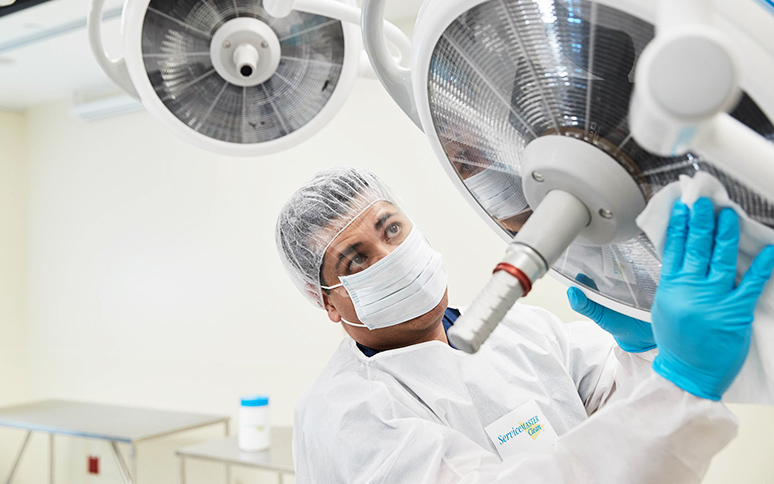How to Prevent MRSA in Hospitals and Medical Facilities
Sometimes, staph bacteria can cause infections in humans. If these bacteria develop a resistance to common antibiotics, meaning that drugs are no longer able to cure the infections, they become more difficult to kill. Also known as methicillin-resistant Staphylococcus aureus (MRSA), these antibiotic-resistant staph bacteria can be dangerous.
MRSA is a hazard that every healthcare facility must take diligent steps to eliminate. Use these tips from the professional cleaning experts at ServiceMaster Clean to help prevent MRSA from developing and spreading in your facility.
What Is MRSA?
According to the Centers for Disease Control and Prevention (CDC), staph is a common bacteria that can be found on about one out of every three people. While most people don’t experience any issues, there are some instances where staph can cause serious infections, like blood infections, pneumonia and skin and wound infections. If left completely untreated, a staph infection could lead to life-threatening complications.
Antibiotics are typically an effective treatment for staph. Unfortunately, the high number of antibiotics given out in healthcare settings has contributed to allowing staph to develop a resistance to those antibiotics. These resistant antibiotics are what we call methicillin-resistant Staphylococcus aureus, or MRSA.
MRSA infections happen most often in healthcare environments like hospitals, nursing homes and outpatient care centers. The CDC indicates that patients are most likely to be infected by MRSA if they have any of the following circumstances:
They are suffering from other health conditions.
They are being treated with invasive medical devices such as catheters.
They are being treated close to another patient who has MRSA.
They have been treated with antibiotics.
They have wounds.
While it is still possible to treat MRSA, treatment is significantly more challenging. That’s why it’s crucial that every healthcare employee stays diligent to help prevent MRSA from developing and spreading in the first place.
How to Prevent the Transmission of MRSA
MRSA acquired in hospitals and outpatient facilities can be prevented when staff, patients and visitors take all the necessary precautions. According to the CDC, there are several things that healthcare staff should do before, during and after treating their patients to help prevent MRSA. Some of the things healthcare providers can do to prevent MRSA include the following:
Perform hand hygiene before, during and after treating patients or coming into contact with bodily fluids.Wear the correct personal protective equipment (PPE) when necessary, including gloves, gowns and face protection.Practice appropriate handling of patient laundry.Limit patients’ exposure to other patients who have MRSA.Conduct proper cleaning, sanitizing and disinfecting throughout the day.
What Patients Should Do When They Get Home From the Hospital
Patients who are returning home after a hospital stay can also take steps to reduce their chances of getting a MRSA infection or spreading it to others, according to THE cdc. Some recommended steps to take after leaving the hospital to help prevent MRSA includes the following:
Finish your antibiotics prescription according to the instructions provided by your doctor.
Wash your hands regularly, especially before and after changing your bandages.
Clean wounds according to hospital instructions.
Do not share personal items like razors or towels.
Wash and dry your bedding and clothing using the hottest temperatures your instruction labels allow.
Follow any additional instructions provided by your doctor.
While staff can take certain steps to limit their patients’ exposure to dangerous infections, it’s also crucial to start with a clean facility. That’s why ServiceMaster Clean is dedicated to delivering the highest standard of clean every time we enter a healthcare facility. Our healthcare janitorial services have been designed using the best practices and procedures provided by leading organizations like OSHA and the CDC to help with risk reduction, infection control and preventing cross contamination. Contact us today to learn how we can help your healthcare facility stay clean and disinfected.







